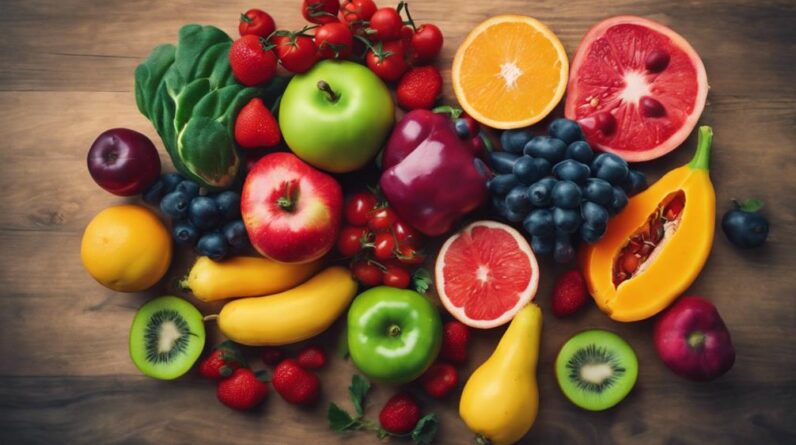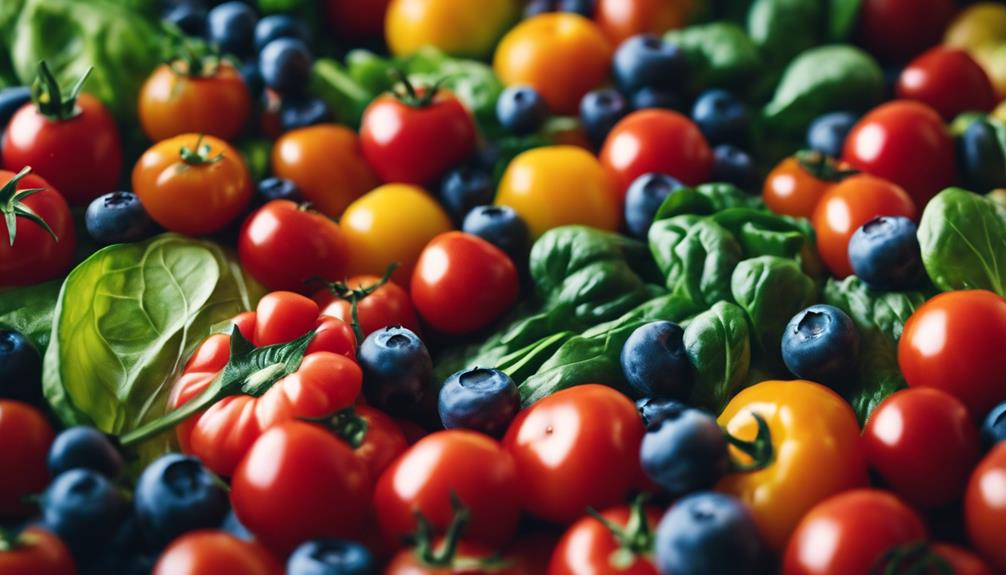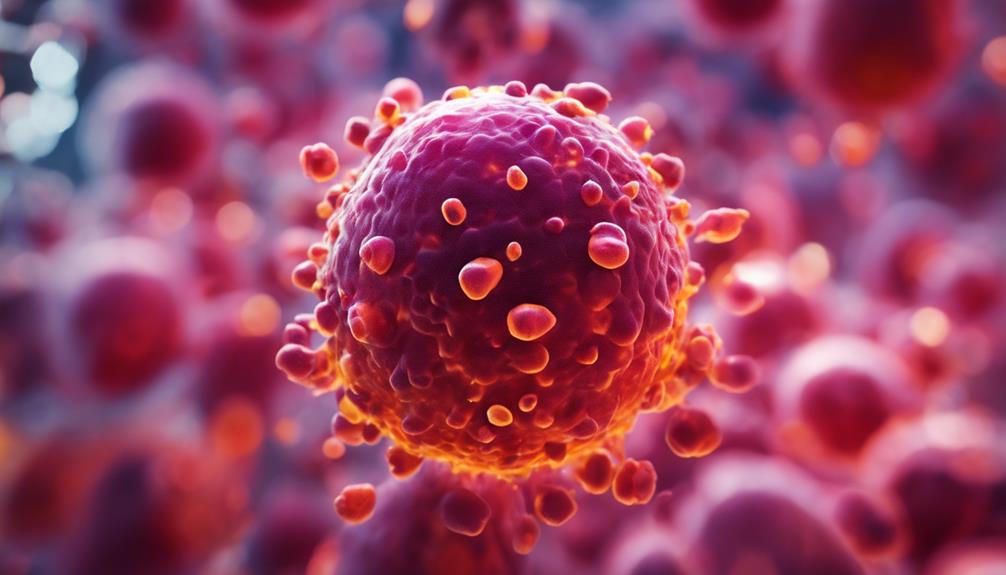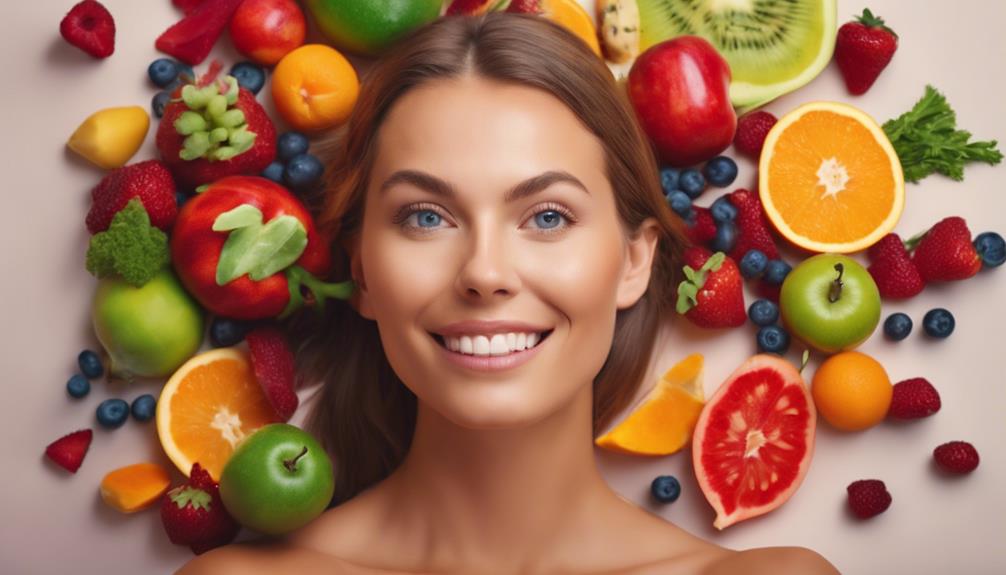
Did you know that free radicals are unstable molecules that can accelerate the aging process by damaging your cells?
But here's where antioxidants come in – they act as the superheroes that neutralize these harmful free radicals.
Curious to uncover how exactly antioxidants work their magic in keeping you youthful and vibrant?
Let's explore the fascinating world of antioxidants and their powerful role in combating aging from within.
Key Takeaways
- Antioxidants neutralize free radicals to combat aging.
- Herbal antioxidants like flavonoids protect cells from oxidative damage.
- Diets rich in antioxidants lower disease risks and promote longevity.
- Antioxidants support skin, heart health, immunity, and overall cellular protection.
The Role of Free Radicals
Understanding the process of free radical formation is crucial in comprehending their impact on aging and overall health. According to the free radical theory, these highly reactive molecules play a significant role in the aging process by causing oxidative stress and cellular damage. Free radicals are byproducts of normal cellular metabolism, but their levels can increase due to factors such as UV radiation, pollution, and unhealthy lifestyle choices.
The accumulation of free radicals can lead to oxidative stress, causing damage to proteins, lipids, and DNA within cells. This damage, if not adequately neutralized, can contribute to the development of various age-related diseases and accelerate the aging process. Longevity is closely linked to the body's ability to combat the harmful effects of free radicals.
Benefits of Antioxidants
Antioxidants play a crucial role in neutralizing free radicals and protecting cells from oxidative damage, thus offering numerous benefits for overall health and combating the aging process. One significant benefit is their impact on longevity. By reducing oxidative stress, antioxidants help maintain the integrity of cells and DNA, potentially extending lifespan. Studies have shown that diets rich in antioxidants are associated with lower risks of chronic diseases and increased longevity.
Moreover, antioxidants have been found to combat inflammation, a common underlying factor in various health conditions. Chronic inflammation can accelerate aging and contribute to diseases such as arthritis, heart disease, and even cancer. Antioxidants help modulate the inflammatory response by neutralizing free radicals and reducing oxidative stress, thereby mitigating inflammation at the cellular level.
Incorporating antioxidant-rich foods like berries, nuts, and leafy greens in your diet can provide you with a natural defense against oxidative damage and inflammation, ultimately promoting overall health and potentially slowing down the aging process.
Types of Antioxidants
Various types of antioxidants exist in nature, each playing a vital role in combating oxidative stress and promoting overall health. Herbal antioxidants, derived from plants, offer a natural and effective way to boost your body's defense against free radicals. Examples include flavonoids in fruits like berries and vegetables like spinach, as well as polyphenols found in green tea and dark chocolate. These compounds work synergistically to neutralize harmful free radicals and reduce cellular damage.
On the other hand, synthetic antioxidants, though commonly used in processed foods and skincare products, may have harmful effects when consumed in excess. Some studies suggest that certain synthetic antioxidants could disrupt the body's natural balance and potentially lead to adverse health outcomes. It's essential to be cautious and mindful of the sources of antioxidants you choose to incorporate into your diet and lifestyle.
When looking to enhance your antioxidant intake, opting for herbal antioxidants from natural remedies is generally a safer and more beneficial choice for supporting your overall well-being.
Sources of Antioxidants
Optimizing your dietary intake with a diverse range of antioxidant-rich foods is crucial for maintaining cellular health and combating the effects of oxidative stress.
When looking to enhance your antioxidant intake, consider incorporating antioxidants from beverages and herbs into your diet. Beverages like green tea, black tea, and coffee contain powerful antioxidants such as catechins, theaflavins, and chlorogenic acid, which can help neutralize free radicals in the body.
Herbal sources of antioxidants include oregano, rosemary, and turmeric, which are rich in compounds like rosmarinic acid, carnosic acid, and curcumin, known for their strong antioxidant properties. These antioxidants from beverages and herbs can aid in reducing oxidative damage, supporting overall health, and potentially slowing down the aging process.
Antioxidants and Skin Health
Enhancing your skin health through the incorporation of antioxidant-rich foods in your diet can help combat oxidative stress and promote a youthful appearance. Antioxidants play a crucial role in maintaining skin hydration and reducing the formation of wrinkles. By including a variety of colorful fruits and vegetables rich in antioxidants such as vitamin C, vitamin E, and beta-carotene, you can support your skin's health from within. Below is a table showcasing some antioxidant-rich foods beneficial for skin health:
| Antioxidant-Rich Foods | Benefits for Skin Health |
|---|---|
| Berries | Aid in skin repair and rejuvenation |
| Nuts and Seeds | Help maintain skin elasticity |
| Green Tea | Reduces inflammation and protects against UV damage |
Incorporating these foods into your daily diet can provide your skin with the necessary nutrients to combat oxidative stress, improve skin hydration, and contribute to wrinkle reduction, ultimately promoting a more youthful and radiant complexion.
Antioxidants and Heart Health
Including antioxidant-rich foods in your diet can significantly benefit your heart health by combating oxidative stress and supporting overall cardiovascular function. Antioxidants play a crucial role in protecting your heart from damage and promoting a healthy cardiovascular system.
Here's how antioxidants can enhance your heart health:
- Heart disease prevention: Antioxidants help reduce inflammation and oxidative damage in the arteries, lowering the risk of heart disease.
- Antioxidant therapy: Studies have shown that antioxidant-rich foods and supplements can improve heart function and reduce the progression of cardiovascular conditions.
- Antioxidants and cardiovascular health benefits: Consuming a variety of antioxidants such as vitamin C, vitamin E, and beta-carotene can improve blood vessel function and decrease the risk of heart attacks and strokes.
- Support for overall heart function: Antioxidants help maintain healthy cholesterol levels, regulate blood pressure, and protect against free radical damage that can harm the heart muscle.
Antioxidants and Brain Function
Antioxidants play a crucial role in maintaining and supporting optimal brain function by combating oxidative stress and protecting against neuronal damage. The brain is particularly vulnerable to oxidative stress due to its high oxygen consumption, making it susceptible to free radical damage. Antioxidants, such as vitamin C, vitamin E, and flavonoids found in fruits, vegetables, and nuts, help neutralize these harmful compounds, thus promoting brain health.
Research suggests that a diet rich in antioxidants may help prevent cognitive decline and reduce the risk of neurodegenerative diseases like Alzheimer's and Parkinson's. These compounds work by reducing inflammation, improving blood flow to the brain, and enhancing communication between neurons. For example, studies have shown that regular consumption of blueberries, a potent source of antioxidants, can improve memory and cognitive function.
Incorporating antioxidant-rich foods into your diet can be a simple yet powerful way to support brain health and protect against cognitive decline as you age. Remember, a nourished brain is a thriving brain.
Antioxidants and Immunity
To further explore the role of antioxidants in maintaining overall health, it's crucial to understand their impact on immunity. Antioxidants play a vital role in supporting your body's defense system, helping to boost immunity and protect against various diseases. Here are four key points to consider:
- Immunity Boost: Antioxidants found in foods like berries, leafy greens, and nuts can help strengthen your immune system, making it more effective at fighting off infections and illnesses.
- Antioxidant Rich Diets: Consuming a diet rich in antioxidants provides your body with the necessary nutrients to support immune function and overall health.
- Cellular Protection: Antioxidants act as cellular bodyguards, shielding your cells from damage caused by free radicals and oxidative stress, ultimately supporting a robust immune response.
- Antioxidant Supplements: In some cases, antioxidant supplements can be beneficial in providing an extra layer of immune support, especially for individuals with specific health concerns or deficiencies.
Antioxidants in Foods
Incorporating a variety of antioxidant-rich foods into your diet is essential for promoting overall health and well-being. Antioxidants play a crucial role in neutralizing free radicals that can cause oxidative stress and damage to cells, ultimately contributing to aging and various diseases.
When it comes to antioxidants in foods, beverages like green tea and coffee are excellent sources. Green tea contains catechins, a type of antioxidant that has been linked to numerous health benefits, including improved brain function and a lower risk of heart disease. Coffee is rich in chlorogenic acid, another potent antioxidant that may help protect against chronic conditions.
Spices are another great way to boost your antioxidant intake. Turmeric, for example, contains curcumin, a powerful antioxidant with anti-inflammatory properties. Cinnamon is loaded with antioxidants that can help reduce inflammation and lower the risk of heart disease.
Antioxidants in Supplements
Consider exploring the efficacy of antioxidant supplements as a complementary approach to enhance your antioxidant intake and support overall health. Antioxidants in supplements can be beneficial, but it's essential to understand their effectiveness and proper dosage recommendations:
- Supplement effectiveness: Antioxidant supplements can help fill in the gaps where dietary intake may be insufficient, providing a concentrated source of these essential compounds.
- Dosage recommendations: It's crucial to follow the recommended dosage guidelines provided on the supplement packaging or by a healthcare professional to avoid potential side effects or interactions with other medications.
- Quality matters: Opt for reputable brands that undergo third-party testing to ensure purity and potency of the antioxidants in the supplements.
- Individual needs: Consider factors like age, health status, and dietary habits when determining the need for antioxidant supplementation to tailor it to your specific requirements.
When considering antioxidant supplements, make informed choices based on your individual needs and consult with a healthcare provider for personalized recommendations.
Antioxidants in Skincare
Explore the benefits of incorporating antioxidants into your skincare routine to combat oxidative stress and promote skin health. Antioxidants play a crucial role in protecting your skin from environmental aggressors such as pollution and UV radiation. By neutralizing free radicals, antioxidants help prevent premature aging signs like wrinkles, fine lines, and age spots. Including antioxidant-rich serums in your skincare regimen can enhance the overall health and appearance of your skin.
Antioxidants offer a range of benefits that can contribute to a glowing complexion. They've anti-inflammatory properties that can soothe irritated skin and reduce redness. Moreover, antioxidants help in brightening the skin tone and improving its texture by promoting collagen production. Vitamin C, for instance, is a powerful antioxidant known for its skin-brightening effects.
To make the most of antioxidant benefits, choose skincare products with a variety of antioxidants like vitamins C and E, green tea extract, or resveratrol. Incorporating these potent ingredients into your skincare routine can help you achieve radiant and healthy-looking skin.
Antioxidants in Aging Gracefully
To understand the role of antioxidants in aging gracefully, it's essential to recognize their impact on cellular health and longevity. Incorporating antioxidant-rich foods into your diet can provide numerous benefits that contribute to a vibrant and youthful appearance.
Here are four key points to help you unlock the secrets of longevity through antioxidants:
- Antioxidant-Rich Diet: Consuming foods high in antioxidants such as berries, leafy greens, and nuts can help combat oxidative stress and inflammation, supporting overall health and vitality.
- Natural Remedies: Many natural remedies, like green tea and turmeric, are rich in antioxidants and have been shown to have anti-aging properties, promoting a more youthful complexion.
- Anti-Aging Solutions: Antioxidants play a crucial role in protecting the skin from environmental damage, reducing the signs of aging like wrinkles and fine lines.
- Longevity Secrets: Research suggests that a diet abundant in antioxidants may help extend lifespan and improve quality of life as you age. Embracing antioxidant-rich foods and natural remedies can be key components in your journey towards aging gracefully.
Frequently Asked Questions
Can Antioxidants Completely Reverse the Aging Process?
Antioxidants possess anti-aging properties, but reversing the aging process completely is unlikely. While they contribute to longevity, their effects have limitations. Controversies persist regarding the extent of their impact on aging and overall health.
Are There Any Potential Risks or Side Effects Associated With Consuming Too Many Antioxidants?
Hey there, when it comes to antioxidants, it's important to be mindful of potential risks. Excessive antioxidant intake drawbacks can include disrupting the body's natural balance and potentially causing harm instead of the intended benefits.
How Do Antioxidants Specifically Target and Neutralize Free Radicals in the Body?
To target and neutralize free radicals, antioxidants work by enhancing cellular defense mechanisms against oxidative stress. Reactive oxygen species are countered by antioxidant enzymes, preventing damage and supporting overall well-being in your body.
Are There Certain Populations or Individuals Who May Benefit More From Incorporating Antioxidants Into Their Diet?
You may see benefits from antioxidants in your diet based on genetic predispositions, dietary habits, lifestyle factors, and medical conditions. Incorporating these nutrients can aid in overall health and well-being, tailored to your individual needs.
Can Antioxidants Help With Specific Age-Related Conditions or Diseases, Such as Arthritis or Alzheimer's?
Antioxidants can play a role in arthritis prevention by reducing inflammation. They also support brain health, potentially aiding in Alzheimer's prevention. Including antioxidant-rich foods in your diet may contribute to managing these age-related conditions.
Conclusion
You've learned about the powerful role of antioxidants in combating aging. Picture your cells as brave warriors, armed with shields against the relentless attack of free radicals.
By incorporating antioxidant-rich foods and supplements into your routine, you can fortify your defenses and support your skin health. Aging gracefully isn't just a dream, it's a scientifically-backed reality with the help of antioxidants.
Embrace the power of these mighty molecules and watch your skin glow with vitality.








